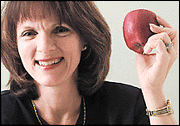


Good For You
Herbal products will continue to be "big business" well into the 21st century, according to speakers at the 28th Annual Current Issues in Nutrition Videoconference on Herbal Remedies presented at the University of Hawaii Saturday. Check facts on
herbals before useIn 1997, Americans spent approximately $5.1 billion on herbal supplements. It is estimated that by 2010, sales of herbal products will be in the range of $25 billion, according to Gail Mahady, a researcher at the University of Illinois.
Recent surveys show approximately 42 percent of American consumers have tried some type of alternative therapy in the past year. Seventeen percent reported consuming herbal supplements on a regular basis.
Americans are using Gingko biloba to improve blood circulation and age-related memory impairment. St. John's is used to treat the symptoms of mild to moderate depression. Echinacea can decrease the number of colds. Saw palmetto is used to treat nonmalignant enlargement of the prostrate. Garlic has been shown to lower blood cholesterol levels and reduce hypertension.
Nine out of 10 physicians surveyed expect herbal medicine to be an important part of their practice in the next five years. However, market research shows consumers who use herbal products are more likely to get their information about herbal medicine from food labels, friends and relatives, and the media, rather than from their doctor. To avoid a potentially dangerous herb-drug interaction, advise your doctor of herbal products you are taking.
Generally speaking, herbs are safer than pharmaceutical drugs. But this doesn't mean that all herbs are safe, that certain herbs are safe for all people, or that herbs are necessarily safe in large doses. Current U.S. dietary supplement regulations provide no guarantee for the content, effectiveness, or safety of herbal products. What's more, there is great variation in the formulation of different brands of herbs.
Consumers should do their homework before they take herbs, says Mahady. Some herbs, such as echinacea and kava, are not recommended for long-term use. Garlic should not be taken with anticoagulant drugs, and should be discontinued 10 to 14 days before surgery. Certain herbs should not be combined with alcohol or antidepressant drugs such as Prozac.
"There are some reports in the literature that the use of Siberian ginseng will decrease blood glucose levels, so anyone who is an insulin-dependent diabetic should be very cautious about using (it)," said Mahady. Panax ginseng may actually stimulate insulin release from the pancreas as well as enhance the activity of insulin.
Mahady recommends people buy herbal products from reputable companies and stay within the recommended dosage limits. The products you buy should be standardized and the label should tell you what the product is standardized to. But in some cases, the active ingredients of herbal products are not clearly defined.
These Internet sites provide information on herbal medicine: National Institutes of Health, Office of Dietary Supplements at http://dietary-supplements.info.nih.gov; National Center for Complementary and Alternative Medicine at http://altmed.od.nih.gov/nccam/; U.S. Department of Health and Human Services at http://www.health finder.gov; American Botanical Council at http://www.herbalgram.org; Herb Research Council at http://www.herbs.org; U.S. Pharmacopeia at http://www.usp.org; Prevention Magazine at http://www.healthyideas.com
Barbara Burke is a Hawaii-Pacific University instructor
who has been teaching and writing about food
and nutrition since 1975.